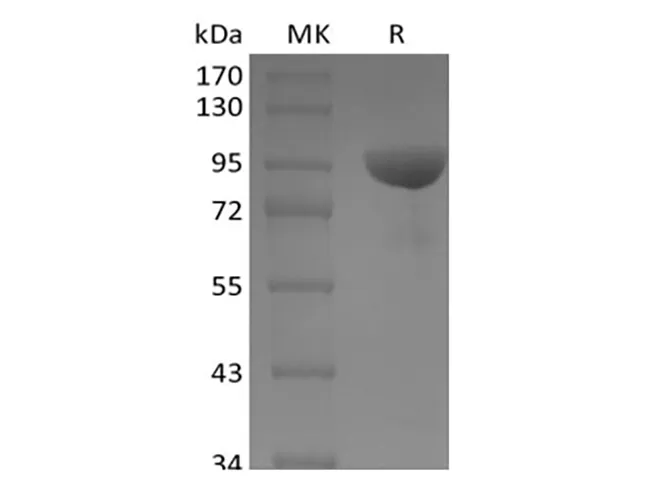Recombinant Human Ephrin B Receptor 1/EphB1 (C-Fc)
CAT:
763-PKSH034040-01
Size:
50 µg
Price:
Ask
- Availability: 24/48H Stock Items & 2 to 6 Weeks non Stock Items.
- Dry Ice Shipment: No




Recombinant Human Ephrin B Receptor 1/EphB1 (C-Fc)
- Background: Ephrin Type-B Receptor 1 (EPHB1) is a single-pass type I membrane protein that belongs to the Ephrin-B family of receptor tyrosine kinases that is involved in embryonic nervous and vascular system development. EPHB1/EPHT2 contains two fibronectin type-III domains, one protein kinase domain and one SAM (sterile α motif) domain. EPHB1 could stimulate fibroblast motility on extracellular matrix in a kinase-dependent manner, which also correlated with its association with Grb7, an adaptor molecule implicated in the regulation of cell migration. It binds to ephrin-B1, ephrin-B2 and ephrin-B3. EPHB1 plays an important roles in diverse biological processes including nervous system development, angiogenesis, and neural synapsis formation and maturation and may be involved in cell-cell interactions in the nervous system.
- Abbreviation: Ephrin B Receptor 1;EphB1
- Synonyms: EK6, ELK, EPH Tyrosine Kinase 2, EPH-Like Kinase 6, EPHB1, EPHT2, Ephrin Type-B Receptor 1, HEK6, NET, Neuronally-Expressed EPH, Related Tyrosine Kinase, Tyrosine-Protein Kinase Receptor EPH-2, hEK6
- CAS Number: 9000-83-3
- UniProt: P54762
- Accession Number: P54762
- Host: HEK293 Cells
- Origin Species: Human
- Tag: C-Fc
- Sequence: Met18-Pro540
- Field of Research: Signal Transduction;Cardiovascular;Neuroscience;Cancer;Stem cells
- Purity: > 95 % as determined by reducing SDS-PAGE.
- Bioactivity: Not validated for activity
- Reconstitution: Please refer to the printed manual for detailed information.
- Molecular Weight: 85-110 kDa
- Shipping Conditions: This product is provided as lyophilized powder which is shipped with ice packs.
- Storage Conditions: Generally, lyophilized proteins are stable for up to 12 months when stored at -20 to -80°C. Reconstituted protein solution can be stored at 4-8°C for 2-7 days. Aliquots of reconstituted samples are stable at < -20°C for 3 months.
